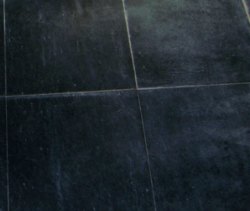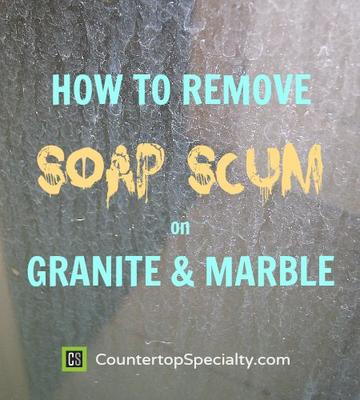How To Remove Soap Scum on Granite & Marble
QUESTION:
How do you remove soap scum stains on marble shower tiles and floor? How about from granite countertops?ANSWER:
Soap scum removal from marble and granite requires a particular cleaning formula. Standard surface cleaners won't work and most commonly known bath & shower cleaners (including ammonia) are too harsh for use on natural stone. These will corrode and dull the surface finish.Use this Soap Scum / Hard Water Remover that is made specifically for safe use on marble, granite, and natural stone. It'll quickly remove soap and hard water films and keep your tile clean. Very effective!
Of course, it works on countertops, shower tile, or floor tile and on all types of natural stone.
Soap scum is stubbornly sticky and proves difficult to remove forming a rather smooth, white or yellow-ish, gummy-waxy film that adheres tenaciously to the surface.
Soap scum removal is the primary cleaning problem in all tubs and showers as well as around many sinks and faucets.
Keep soap scum from building up and you'll also reduce the chance for developing mold, mildew, and dirty grout.
Homemade remedies like a dilute ammonia and water solution may "work" to remove the soap scum, BUT the ammonia will cause marble etching leaving chalky dull spots or streaks or ruining the entire finish on the marble or travertine tile.
Ingredients in standard, brand-name shower cleaners will etch marble and travertine as well. So... these are not a viable choice.
Marble cleaning requires the use of products made specifically for marble like the top stone care cleaners we recommend.
Granite is less sensitive to chemicals than marble, but repeated use of harsh cleaners can dull granite over time. So, using stone-specific cleaners is the safest way to maintain your natural stone countertops and tile in top condition.
Cleaning with "Soap & Water" produces a predicament. This mix is often recommended as a cheap and easy method for cleaning marble and natural stone.
 |
It's important to note that even with all that water washing soap away in a shower... soap scum still builds up on the shower walls and floor tile.
Soap cannot be avoided in the shower, but it should be avoided for cleaning granite countertops, cleaning marble, or when cleaning travertine tile, and other stone.
The soapy residue will leave streaks making it hard to buff the surface to a nice, clean shine... and, in time, a soap film will develop on your granite & marble countertops and floors (just like in a shower or bath) making them look dull and dingy.
At this point, "general" stone or marble cleaners will not be potent enough to remove soap scum, which leaves homeowners wondering what the heck is happening.
You simply need to use the specially-formulated "Soap Scum / Hard Water Remover" for natural stone suggested above.
Of course, we all use soap around bathroom and kitchen sinks, so countertops will be exposed to some soap naturally. The problem occurs when regularly using soap as the cleaner over the entire countertop.
Hard water stains from mineral build-up (lime, calcium scale) look similar to soap scum.
Luckily, the same type of cleaning formula (Soap Film / Hard Water Cleaner mentioned above) works for both hard water and soap scum.
Spray it on and let it soak for 10-15 minutes into the on the soap scum or hard water deposits. Then scrub with a soft-bristle brush. Repeat if you have a lot of build up.
Once you've thoroughly cleaned the surface it won't be so difficult to keep soap scum from developing in the future with frequent light use of this product.
One last point... Soap scum and marble etching can sometimes be difficult to distinguish. Both look like dull, whitish areas. To correctly diagnose which you have, scratch with a fingernail or other soft/plastic scraper. You should be able to scrape off heavier buildup of soap scum or hard water deposits.
Comments for How To Remove Soap Scum on Granite & Marble
|
||
|
||
|
||
Soap Scum On Granite Countertops
by Carrol Maxwell
(Vidor, Tx.)
QUESTION:
There is "soap scum" appearing marks where the dish drain board sits on the granite countertop.We cannot clean it away. I did not put a drain board under the dish drain, thinking granite could not be damaged.
Is this because the installer did not properly seal the granite countertops? The rest of the counter top is fine. The counter is about 10 yrs. old.
How do I remove this soap scum?
ANSWER:
It may be soap scum, but it could also be hard water deposits.Both can form a whitish type film that can be very tenacious and can't be removed with general methods for cleaning granite countertops.
Soap scum is waxy and hard water deposits are more crusty.
You'll have to use a specialty stone cleaner, but fortunately the same granite cleaner will take care of both soap scum and/or hard water.
We recommend using this Soap Scum / Hard Water Remover made just for this issue and safe for use on marble and granite countertops, showers, baths, etc.
And to dispel any misconceptions... granite can be damaged. Every single type of countertop surface available on the market can be damaged... some more easily than others.
Granite is certainly one of, if not the hardest to damage, but it can occur. So, proper granite countertop care and maintenance is still important... it's just easier than other surfaces.
Try the Soap Scum/Hard Water remover, however, if it turns out that you indeed have a "stain" (darker spot of something absorbed into the surface), then follow the directions in the Removing Granite & Marble Stains ebook.
You should also perform the water test for sealing granite countertops to see if it might be time to re-seal your granite.
If so, I'd suggest using one of these recommended marble & granite sealers, with SenGuard being the absolute best available.
Sealing will not prevent the build-up of soap scum or hard water deposits since these occur on the surface of the stone. However, a sealer will help prevent absorption and staining that sometimes can occur with prolonged hard water deposit exposure.
Return to Marble Cleaning Questions & Answers.
Removing Soapy Film
from Marble Flooring
by Gretchen Poole
(Shelbyville, KY)
QUESTION:
A housekeeper used Murphy's Oil Soap on the marble floor tile.
Is there any way to remove this dull, waxy finish and bring it back to its original shine?
ANSWER:
Yes.... So, don't be too hard on your housekeeper. She was probably only doing what many others in the cleaning industry have erroneously learned to do.
Murphy's Oil Soap claims to be safe for marble and that it leaves no residue. This is not true when applied to marble... But even when applied to wood it leaves a residue that builds up.
In fact, there is a bit of controversy in the wood flooring and furniture industry about the use of Murphy's Oil Soap.
Many wood professionals vehemently recommend NOT using Murphy's Oil Soap precisely because of build-up and refinishing issues.
This advice is certainly true for marble tile and applies to any wax or film-forming product, not just Murphy's oil.
Waxes and other topical coatings (that are essentially permanent or require stripping to remove should not be applied to natural stone surfaces and especially not flooring.
Topical coatings:
- Can cause yellowing of the stone
- Do not allow natural stone to breath trapping moisture
- Scuff, scratch and attract dirt and grime
- Require maintenance of the coating itself (vs. the marble)
Strip the soapy wax off the floor using this recommended De-Greaser / Wax Remover / Stripper. It's the best we've found.
Once the wax / oil coating is removed, you can then assess the condition of the marble. Sometimes waxes can yellow marble. Or you may noticed dull areas that have been "etched".
Often waxes and other products like Murphy's Oil are applied in a misguided attempt to "polish" dull tile flooring.
The shiny marble polish or finish is not from a product. It's a physical part of the marble itself created by grinding and smoothing until glossy.
The reason a "polished" finish becomes dull isn't from a lack of Murphy's Oil or any other "polish" or product.
Dull marble tile is the result of:
- Wear & tear from use and foot traffic
- Use of harsh / caustic household cleaners (most are bad for marble)
- Spills of acid foods, drinks or other substances
Acidic foods and damaging cleaning chemicals cause marble etching.
Marble etching or discoloration require solutions beyond stripping wax off the marble flooring.
Of course, if the floor is in good condition once the wax coating is removed it may only need regular cleaning with an appropriate and effective marble floor tile cleaner like the Tile Floor Cleaner.
Good Luck!
Return to Marble Cleaning Questions & Answers.




